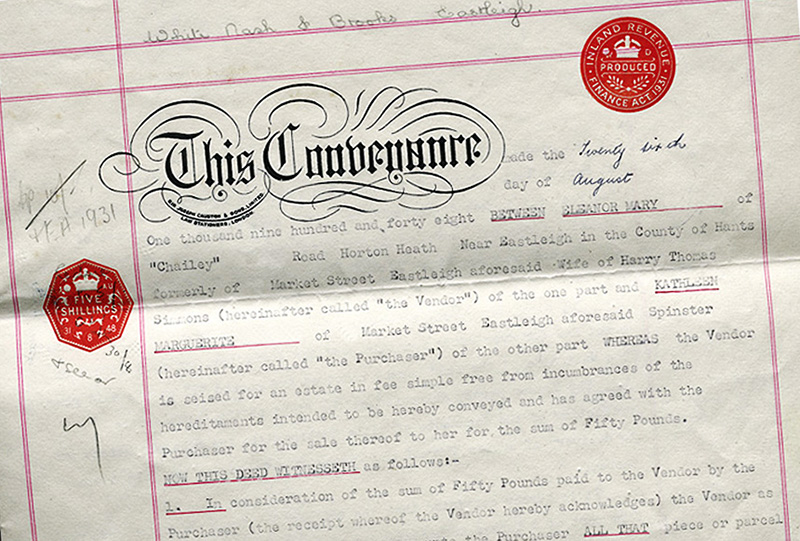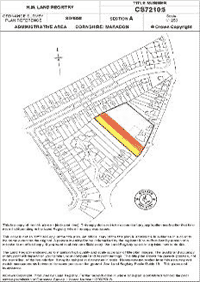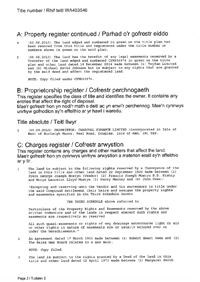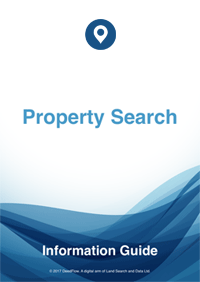Associated Documents
Contents
Overview
The old method of transferring ownership of a property from one person to another was a laborious process requiring the drafting of Associated Documents, proving Root of Title, creating or checking Abstracts of Title and so on. Once upon a time these deeds were hand written on large sheets of parchment. The process of transferring was changed when Land Registration was introduced. This was, at first, phased in throughout our country, county by county, but as from April 2000 all properties have to be registered following a sale or mortgage.
Land Registration is much less complex, quicker and cheaper, and evidence of ownership is established by having the property registered at the Land Registry, who maintain a Title Register and Title Plan. These documents are held digitally and can be obtained quickly at any time.
Associated Documents, however, still have their place. They can be very useful for resolving issues such as property boundaries, rights of way and prior ownerships.

Types of Associated Documents
Transfer Deed
The law provides that for a legal document transferring ownership of real property, to be authentic it must be executed as a Deed, and so solicitors continue to prepare a Deed. This is called a Transfer Deed. The Deed reflects the contents of a contract that is prepared in readiness for completion of the purchase. The Deed follows a standard format. Following completion of the purchase, the purchaser’s solicitors will send the Transfer Deed to the Land Registry for registration.
Some Transfer Deeds contain detailed legal information that can be considerable in size. When this happens the Land Registry may take a digital copy of the Deed and make a note in the Register that a copy has been made. This means that a person can obtain a copy of the Deed from the Land Registry at any time. A copied Transfer Deed usually contains more detail than is shown in the Title Register, e.g. relating to restrictive covenants or rights of way.
Conveyance
All Deeds which have been retained in digital format can be purchased. A Conveyance is useful for tracing past ownerships and purchase prices where Prior Copies are not available (they are not available for dates before 1993 or before First Registration). Copy Conveyances are also useful for further details of restrictive covenants, easements, restrictions, and the like).
Abstracts of Title and Epitomes of Title
When a solicitor deals with properties that are not registered, part of the process of conveyancing requires him to investigate the Root of Title, i.e. the chain of ownership from the vendor to the last person who owned the property beyond 15 years prior. This may be recorded by him or a solicitor dealing with a previous unregistered purchase in an Abstract of Title or an Epitome of Title.
Abstracts are written copies of the salient parts of Deeds that together form a good root of title. Epitomes are a list of Root Deeds with copies appended.
Trust Deed
A Trust Deed is a conveyancing document that contains a declaration that the property is held in trust, and states the relationship between the trustee and the beneficiary of the trust. As the Trust Deed contains the names of all the original trustees this may be a useful document to obtain as the Title Register only lists four of the trustees. However, over time the trustees are often changed and so the named trustees in the Deed may not be up to date in any event.
Lease
The Lease embodies the contract terms between the Lessor and Lessee, and is usually created where part of a property is sold separate from other parts of the property, as with a flat. As such the easements and covenants between the parties, and the common parts of the building, the maintenance obligations of the freeholder and the various leaseholders, and the various restrictions on how the property should be used and decorated, may be complex and the descriptions of the same may take up numerous pages. The Title Register will not necessarily contain all this detail, and accordingly the Lease (and any attached Lease Plan) are an essential part of the documents of title. This means that although the Title Register and Title Plan are the current legal documents of ownership, where the property is leasehold then the legal documents of title also include the Lease, which you should keep a copy of.
Wayleave Agreements
Wayleave agreements are contracts between the owner and a third party, e.g. relating to the installation of solar panels or the installation of bill boards, mobile phone masts, etc. These agreements will specify access rights and other contractual matters such as fees or rents.
Deeds relating to Restrictive Covenants and Easements
The creation of a new easement or the release of a restrictive covenant will need to be made by Deed. Such Deeds are often copied by the Land Registry and will provide useful information pertaining to such rights and releases.
Profits a Prendre in gross
Profits a Prendre relate to minority rights. Where these are created by Deed for 5 or more years they may be registered. Fishing Right Deeds are usually copied by the Land Registry, provide useful information. For example, a Fishing Rights Deed may contain detail of the type of fish, the number of fish and type of fishing allowed.
Obtaining Copies of Associated Documents
Not all Deeds are retained digitally by the Land Registry, and only those that are can be purchased. When a Deed is retained digitally the Land Registry insert a file note in the Title Register at the end of a paragraph referring to the Deed, to the effect that a copy has been made. Copies of such can be obtained using the Associated Documents search.
Associated Documents
Deeds creating Restrictions, Covenants, Easements, etc. are often kept digitally by the Land Registry and made available for sale due to their invaluable detail and content to assist in further understanding the Restrictions, etc.
£29.95Title Register
The Land Registry Title Register holds data relating to the property ownership, purchase price, mortgage, tenure, covenants, rights of way, leases and class of title.
£19.95Lease
The Lease and its Lease Plan usually form one document and are both provided for the one fee. They are very useful in resolving disputes, particularly with car parking and other shared areas
£29.95


